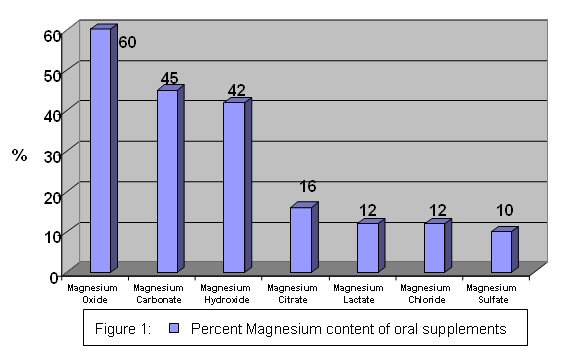|
Magnesium supplementation may be indicated when a specific health problem or condition causes an excessive loss of magnesium or limits magnesium absorption.
Oral magnesium supplements combine magnesium with another substance such as a salt. Some of those supplements include magnesium oxide, magnesium sulfate, and magnesium carbonate. The amount of elemental magnesium in a compound and its bioavailability influence the effectiveness of the magnesium supplement. Bioavailability refers to the amount of magnesium in food, medications, and supplements which are absorbed because of human activity, and cell and tissues health. The experiences show lower bioavailability of magnesium oxide, with significantly higher and equal absorption and bioavailability of magnesium chloride and magnesium lactate. This will be good support either for magnesium dietary supplements or magnesium bioavailability to help the deficient levels of magnesium.

Magnesium supplements help people's diseases. For example diabetes is a disease resulting in inefficient use of insulin. Insulin is a hormone made by the pancreas and it helps convert sugar and starches in food into energy to sustain life. From that disease suffer not only adults but children who can't make insulin from early age. Magnesium plays an important role in carbohydrate metabolism. It helps and activates the insulin hormones and control blood sugar. Because of that people with low blood levels of magnesium (hypomagnesemia) mainly have diabetes. Individuals with insulin resistance do not use insulin efficiently and require greater amounts of insulin to maintain blood sugar within normal levels. It becomes dangerous when kidneys lose their ability to retain magnesium during periods of severe hyperglycemia.
The Nurses' Health Study (NHS) and the Health Professionals' Follow-up Study (HFS) follow more than 170,000 health professionals through biennial questionnaires. Information about the problem with dietary supplements, including multivitamins is collected carefully. The risk of diabetes was greater in men and women with a lower magnesium intake. This study supports the dietary recommendation to increase consumption of major food sources of magnesium. Most experiences and studies show the necessary dose of magnesium supplements is 300 mg/day. That's the quantity to keep our health according to elemental magnesium. Of course additional research is needed to better explain the association between blood magnesium levels, dietary magnesium intake and diseases.
Magnesium metabolism is very important to insulin sensitivity and blood pressure regulation, and magnesium deficiency is common in individuals with diabetes. But it can influence cardiovascular disease. Some observational surveys have associated higher blood levels of magnesium with lower risk of coronary heart disease. Some dietary surveys have suggested that a higher magnesium intake may reduce the risk of having a stroke. Those knowledge show different views - consuming recommended amounts of magnesium may be beneficial to the cardiovascular system. So, there are magnesium supplements to determine the cardiovascular disease. Today many doctors and scientists research different uses of magnesium supplements to predict the effect. But we needed more studies and knowledge for better understanding the complex relationships between magnesium intakes, indicators of magnesium status, and heart disease.
Magnesium and osteoporosis are problem, too. Bone health is supported by many factors, most notably calcium and vitamin D. However, some evidence suggests that magnesium deficiency may be an additional risk factor for postmenopausal osteoporosis. So, some scientists think that magnesium supplementation may improve bone mineral density, too.
Diets that provide recommended levels of magnesium are useful for bone health, but further investigation on the role of magnesium in bone metabolism and osteoporosis is needed nowadays.
Magnesium supplements are given to autistic children, nearly 30% of the cases. There is no exactly standard of what dosages of magnesium and vitamin B6, or types of magnesium should be used from autistics. The aim of magnesium supplementation is to normalize the low levels in tissues, apposite analyses, such as erythrocyte magnesium measurements. It is important not only for health risked people but for future generation.
Source: dietary-supplements.info.nih.gov
|
